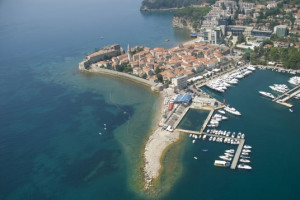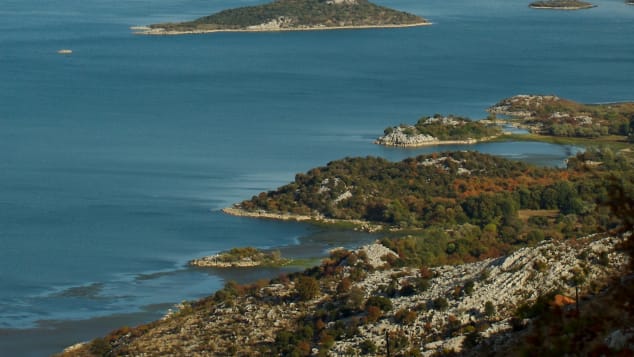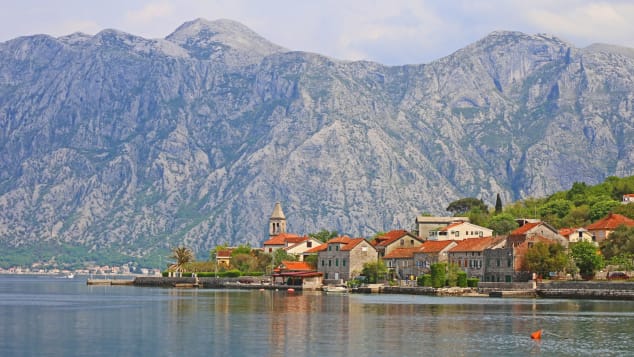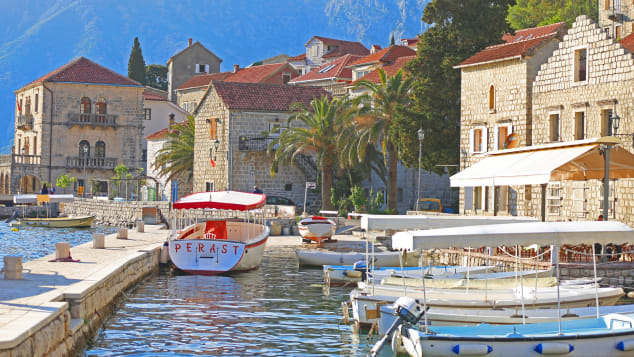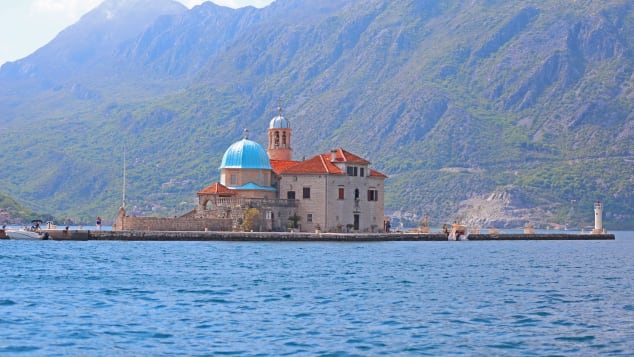(CNN) — Heroic-looking
highlands, pretty blonde bays overlooking the royal blue Adriatic Sea,
antique Venetian villages and UNESCO walled cities.
Montenegro might be small, but this gorgeous nation has a huge array of natural and man-made wonders.
Once overlooked in favor of more well-known Mediterranean nations, Montenegro is fast gaining a reputation as a great place to travel. It's easy to see why.
Mountainous
hinterland nestles deep canyons, gushing rivers, glacial lakes and
primeval forest, popular for adventure activity. The serpentine coast
skirts glistening ports, from palazzo-embellished Perast in
UNESCO-protected Bay of Kotor, to Tivat, a swanky super yacht marina.
New
cruise ship routes, more flights, a popular land border with Croatia
and whisperings amongst trailblazing travelers are drawing an influx of
tourists to this honeypot. Abuzz with new five-star luxury hotels, such
as the highly anticipated Chedi, and new high-end international
restaurants, headlined by Nobu, Montenegro is the emerging must-see
destinations of the Adriatic.
Here are the 20 best things to see:
1. Budva
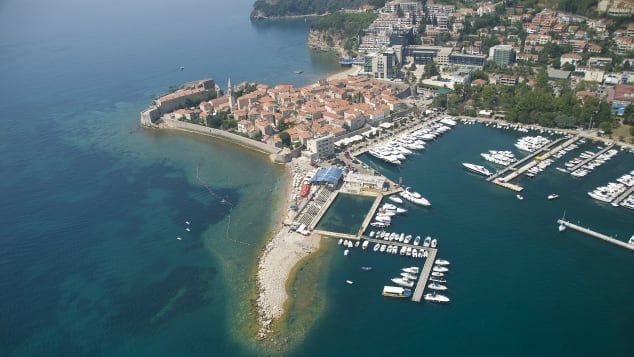
The glamorous coastal town of Budva is a Montenegro highlight.
Courtesy National Tourism Organization of Montenegro
Beaches,
glitz and history blend in equal measure in the most-visited
destination in Montenegro. Budva Riviera is a playground of shiny
super-yachts and pulsating nightlife. By day, it's glamor at the
beaches. Jaz beach is effervescent during
Sea Dance Festival in summer.
Ancient
history is there in the waterfront stone old town, Stari Grad, where
marble streets and Venetian walls jut out of crystalline waters. Views
from the Citadela are unparalleled, by day or while dancing the night
away.
An amble through Budva Museum, the town walls, churches and Gallery of Modern Art allows sense of place.
Tip: For
a breather, head six kilometers out of town to the charming village of
Krapina, a hidden nature's oasis unknown even to many locals.
Pojata makes a charming lunch stop.
2. Herceg Novi
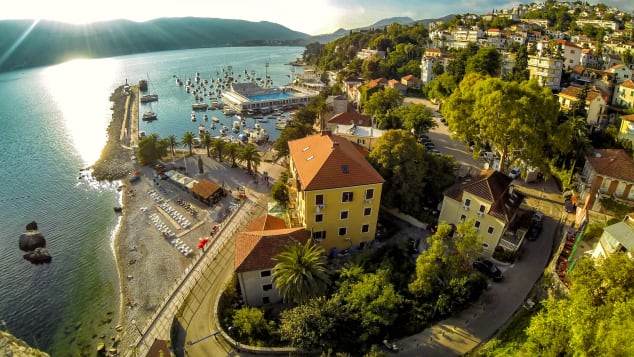
Herceg Novi is glorious coastal town with varied architecture and an interesting history.
Courtesy National Tourism Organization of Montenegro
The fortified city acts as gatekeeper to the UNESCO Bay of Kotor,
Montenegro's crowning glory. Stari Grad's soul-stirring feat of
enchanting churches and centuries-aged fortresses is given new lease of
life by buzzing cafes, restaurants and bars.
Swimmers
will delight in pristine waters at the pebble bay. Olive groves burrow
the 300 meter-long Žanjic beach, while Uvala Veslo is for adventurers
seeking cliff-jumping and strong swimming currents.
Tip: For
a touch of the quaint, Rose village hamlet at the tip of the peninsula
serves a clutch of authentic summer al fresco dining spots, with
glorious views.
3. Lake Skadar
When a lake is shaped like a dolphin, you know it's going to be impressive.
Courtesy National Tourism Organization of Montenegro
Lesser-known
and a true Montenegrin highlight, Skadar forms the largest freshwater
lake in the Balkans, straddling Montenegro and Albania. The former
summer residence of the Montenegrin royal family is a wildlife
wilderness and birder's paradise, comprising rolling green Karst
mountains, floral fields and lily-strewn lakeshores.
Boat
tours traverse the wetlands from between one to six hours, taking in
island monasteries, traditional fishing villages, fortresses, ancient
monuments and hidden beaches. All this is reinforced by 260 species of
bird, 50 species of fish and three types of resident snake.
Tip: Visit lakeside villages for a feel of the battleground that was Skadar Lake,
contested during the 13th century Turkish invasion. Several villages
have a strong Albanian flavor, with mosques and bilingual residents.
4. Tara Canyon
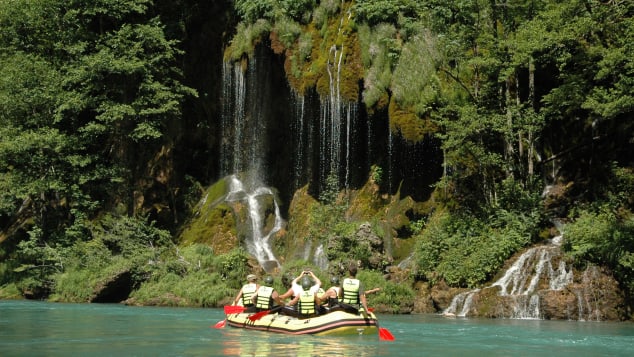
White-water rafting on the river is a must for thrill-seekers visiting Montenegro.
Courtesy National Tourism Organization of Montenegro
A
150 meter-high bridge on the Tara River is widely known as one of the
most beautiful in the world. Clad in dense pine forests and clear lakes,
the 82-kilometer canyon is one of the world's deepest and largest,
splicing the mountains of Durmitor National Park, a UNESCO World
Heritage Site.
Celebrated
whitewater rafting, jeep safaris, canyoning and zip-lining satisfy the
adrenaline junkies, but for those wanting a bird's eye view, head up
Mount Ćurevac.
Tip: Rafting the Tara Canyon is a famed activity. Various levels and durations make it open to most. Rafting Montenegro offers a huge variety of tours at various adventure and price levels. Choose a reputed operator for safety.
5. Durmitor
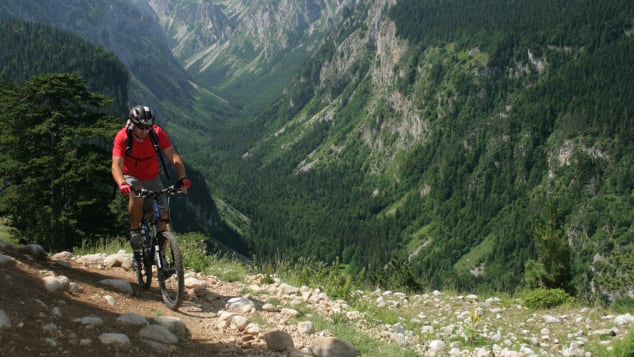
Durmitor National Park -- formed by glaciers -- is a place of extraordinary natural beauty and perfect for mountain biking.
Courtesy National Tourism Organization of Montenegro
Created
by glaciers and crisscrossed by underground streams and rivers, the
Durmitor National Park limestone massif spans 39,000 acres across
north-western Montenegro and Bosnia & Herzegovina.
Switchbacks
and hairpin bends make an exhilarating drive, past glacial lakes and
rocky outcrops, including the tallest peak in Montenegro,
Bobotov Kuk at
2,523 meters. This segment of the Dinaric Alps is embodied by
captivating peaks, protected forests sheltering bears and glacial lakes
embedded in the Tara River Basin Biosphere Reserve.
Eighteen
glacial lakes known as "mountain eyes" bejewel the land, of which Black
Lake is largest. The park also houses 12 to 16th century Stecci;
elaborately decorated carved tombstones and blocks.
Tip:
Take passports along, as drives can cross borders. Trekking,
mountaineering, affordable Alpine and Nordic skiing, fishing and camping
are great ways to experience Durmitor.
6. Kotor
Kotor Old Town,
a UNESCO World Heritage site, is a living breathing museum. The rabbit
warren Old Town is a showcase of crumbling churches, Venetian-inspired
architecture where the palazzo of wealthy seamen dot the shores.
The region's proud seafaring history is portrayed in the Maritime Museum of Montenegro, one of the most comprehensive museums on the Adriatic coast. The beauty of Kotor lies in its ancient relics brought to life by locals who still inhabit the town and frequent it's offerings.
A
steady 1,200 meter ascent of the 14th century town walls rewards
visitors with magazine cover views across the deeply-indented fjord-like
Bay of Kotor, coined Boka Bay.
Tip: No coastal trip is complete without sampling local delicacies. Visit the waterfront Galion restaurant for squid-ink risotto, seafood bouillabaisse and monkfish dishes, washed down with Vranac Montenegrin wine.
7. Njegos Mausoleum
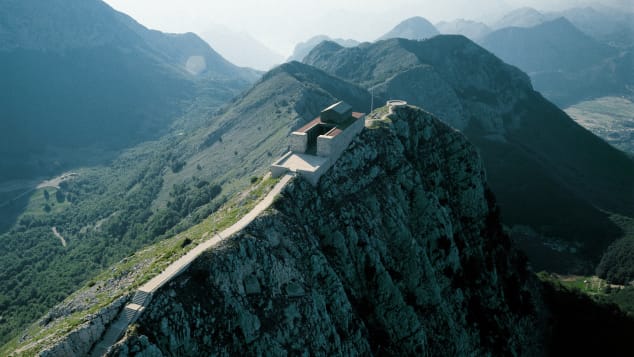
Climb the 461 stairs to the top of the Mausoleum and admire the sweeping views of Montenegro.
Courtesy National Tourism Organization of Montenegro
Extreme altitudes and two distinct climatic zones, Mediterranean and Continental, make Lovćen National Park a rugged and craggy landscape.
Located in the rocky Dinara Alps, on the second highest peak 1,675 meters above sea level, the park is home to the mausoleum
of former Montenegrin ruler Petar II Petrović-Njegoš. Housed in a
marble chapel, up 461 steps, is a winged granite eagle bearing his
remains. Above it, 200,000 gilded tiles create a dazzling gold ceiling.
Views from here are dazzling and dizzying.
Tip:
Nearby Njeguši village, birthplace of the Petrovic dynasty, is the
place to indulge in divine home-made cheese and prosciutto smoked hams,
made the local way.
8. Ostrog Monastery
Carved
into a sheer vertical cliff, the piercing white Ostrog Monastery is a
sacred pilgrimage for Orthodox Christians and entire gamut of religions.
The incredulous feat of architecture is surrounded by bountiful scenery
of the rolling Zeta valley.
Founded
in the 1600s, by the Bishop of Herzegovina Vasilije, whose remains are
enshrined in the upper cave church, the monastery's inside walls are
covered in antique painted frescoes. The ancient upper monastery houses
two spectacular churches and is widely considered a miracle, as nobody
knows how it came to be.
Tip: The lower monastery has bunks, mats and blankets for summer visitors wanting to spend the night.
A natural spring behind the monastery provides refreshing water. Modest clothing is needed to enter the shrine.
Tour
buses operate day trips here from most popular spots in Montenegro, at
around €30. Or take the train to Ostrog station and hike up for an hour.
9. Sveti Stefan
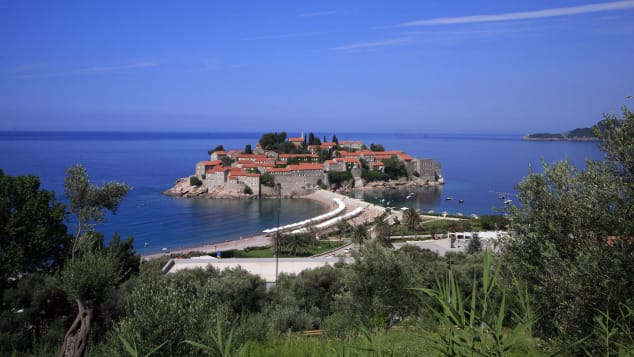
In the 1960s-80s, the island was the playground of celebrities such as Elizabeth Taylor and Sophia Loren.
Courtesy National Tourism Organization of Montenegro
Sveti
Stefan island graces global magazine covers. It's easy to see why. A
red-roofed tangle of irregularly shaped whitewashed stone villas is
suspended above turquoise sea, linked to a pink-sand beach by a jetty.
Formerly
a fishing village jutting out on a peninsula, the walled island was a
haven for families needing protection from invading Turks and pirates in
the 1400s. Churches and ancient inscriptions are peppered throughout.
Tip: Now
owned by the exclusive Aman resorts, only paying guests can enter the
island, but a reservation at the on-site Nobu restaurant is good way to
get a look in. Nearby,
Crvena Glavica is a set of seven beaches of coarse flame sands, where clothing is optional.
10. Perast
This eye-catching stone town of Perast is a photogenic marvel of palazzos, exquisite from every angle.
The
highlight floats offshore, where two picturesque island churches take
centre-stage. Boat trips depart regularly from Perast.
Tip: Feast at Hotel Conte,
a beautifully appointed and authentic waterfront property with
residences on the Bay of Kotor. The seafront terrace serves extravagant
seafood platters, fresh from the Adriatic.
11. Island Churches, Kotor
Seen from any panorama across the Bay of Kotor, two showstopper islands drift off the coast of Perast.
The lush 9th-century Benedictine abbey of Sveti Djordje or St. George,
clad in elegant cypress trees, and 15th-century Our Lady of the Rocks
church are photogenic visuals.
It's
believed the church was erected by locals depositing stones around a
rock apparition of the Madonna and Child. Inside, the 1630 narrow church
is adorned in paintings, donated silver votives and a precious
hair-woven image of Madonna and Child. Regular boat trips are the best
way to get up close.
Tip: Time a visit with the annual Fašinada festival,
on July 22, to witness a spectacle of hundreds of rowboats symbolically
reinforcing the foundations followed by a vibrant sailboat regatta.
12. Ulcinj
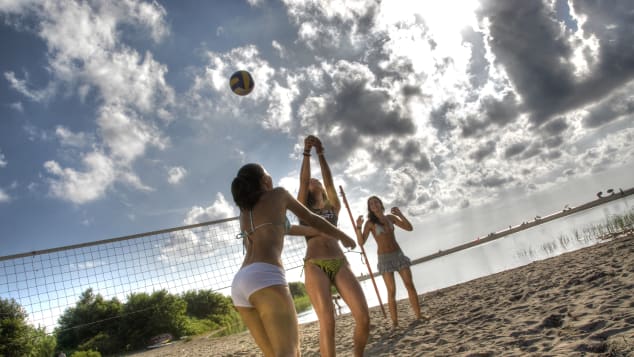
Beachside fun in Ulcinj.
Courtesy National Tourism Organization of Montenegro
The
southernmost town of Ulcinj, near the Albanian border, offers a unique
Eastern feel owing to its former Ottoman control. At the fall of the
Ottoman navy, Ulcinj became a notorious pirate lair. Today, the town is a
curious mix of mosques, minarets and prominent nudist beach.
Standing over the town, Sailor's Mosque, a former lighthouse, offers sumptuous views.
Stari
Bar makes a fascinating stroll past Arabic inscriptions, Turkish baths
and clock tower confirming the comingling of East and West. A
purportedly 2,000-year-old olive tree stands testament to the evocative
evolution of Ulcinj.
Tip:
Hidden wonders lie offshore. Deep-sea fishing and diving are popular
activities, amongst historic ancient shipwrecks brought down during the
centuries-endured piracy boom.
13. Biogradska Gora
While the coastline sees much of Montenegro's action, Biogradska Gora, the smallest of the National Parks, is one of only a handful of primeval forests left in Europe.
Lake Biograd, shrouded in foliage, with its still waters mirroring the lush rugged surrounds.
Popular activities include mountaineering, skiing, camping, trekking, four-by-fouring and mountain biking.
Tip:
It's easy to drive through the national park, but for those wanting to
hike or trek, well-marked trails start at Biograd Lake. Camping is
allowed and there are some accommodation huts, for those wanting to stay
and explore.
14. Cetinje
The
honorary capital of Montenegro is charming in its authenticity. It's a
short drive in from the coast at Budva to the 15th century former royal
capital and cradle of Montenegrin culture.
Oozing heritage reminiscent of its heyday, Cetinje is
historically glorious without the flash. A walking tour is the best way
to explore sights in this compact center. The monastery houses relics
of St Peter of Cetinje, a bishop credited with defending the country
against enemies.
Not to be missed are the museums such as the sprawling National Museum, Blue Palace and current home to the President, stone Vlach church, royal theater and notable foreign embassies.
Tip: Four kilometers from Cetinje, Lipa Cave
is a sprawling underground lair of passages, pillars and spikes.
Options to explore include everything from a brief and easy visit to an
adventurous arduous day reserved for the fit.
15. Lustica Bay
A brand new town has being built on the coast of Montenegro. Situated on Luštica peninsula in the northwestern bay of Trašte, it's a show of emerald Adriatic seas backed by jade mountains.
Year-round
sunshine, olive groves, crystalline waters and forested hills give it
an island feeling, yet with proximity to three airports.
The
town will feature more than a thousand homes, villas and townhouses,
two marinas, seven hotels, championship golf course and a host of
recreational and medical facilities.
Open since 2018, the Chedi Luštica Bay
is the largest five-star luxury hotel in Boka Bay. The Asia and Far
East established hotel group, synonymous with chic, luxurious,
design-led style, is set to raise the hotel standards in Montenegro.
Tip: Another luxury five-star hotel raising the bar is the One & Only Portonovi.
Elegantly positioned at the entrance to Boka Bay, it's a haven of
nature and luxury, with a pool stretching into the Adriatic coastline.
A nearby state-of-the-art marina and private jet airports steers in luxury travelers.
16. Podgorica
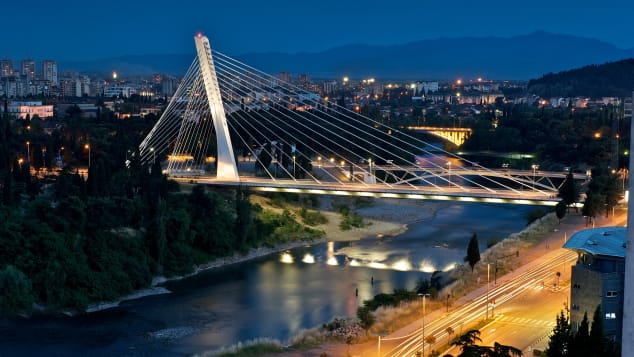
The Podgorica Millennium Bridge is an eye-catching landmark in Montenegro's capital city.
Courtesy National Tourism Organization of Montenegro
This
ancient city oversees the confluence of rivers Morača and Ribnica. The
capital city of Montenegro is a jumble of architecture and unsubtle
buildings, from glitzy new shopping centers to Ottoman curios.
Stara Varos
is the Ottoman Turkish heart, with hints at it's buzzing past. Mosques
stand today. The striking new Orthodox cathedral features a large dome
and tall gold crosses, shooting into the skyline. Controversial frescoes
are worth a marvel.
Tip: An easy day trip from Podgorica is Niagara Falls
(or Nijagarini vodopad), a pretty natural waterfall just 10 minutes by
car or taxi from the town. Visitors swim in the pools in summer.
17. Porto Montenegro
Forget the French Riviera, Porto Montenegro in Tivat is a glamorous port attracting yachts from across the globe.
Courtesy National Tourism Organization of Montenegro
The youngest kid on the tourist scene is a stark contrast to the ancient fishing villages of the Bay of Kotor.
Positioned
on a sunny peninsula at the foot of Mount Vrmac, Tivat was once the
region's center of salt manufacturing as well as a strategic naval base.
Today, it hosts an international airport and is undergoing a
jetset-lifestyle renaissance thanks to its new superyacht marina.
Porto Montenegro,
a massive redevelopment of the old naval base and shipyard, is a
burgeoning tourism hub, drawing in huge foreign investment and the
international nautical community.
Tip: It's impossible to miss the regal Regent Porto Montenegro hotel, an elegant boutique building occupying a strategic corner of the marina.
Coffee
and cake refueling stops are a must here, before visiting the Naval
Heritage Collection museum. The Regent spa is unadulterated bliss on the
harbor, while the cuisine is of international gourmet standard.
18. Sveti Nikola
An offshore island languishing in the Adriatic Sea sunshine, lush and uninhabited Sveti Nikola is Montenegro's largest island.
With
deer as the only permanent residents, it's a popular getaway for locals
and tourists in the summer, who cross on regular boat ferries from
Budva.
A small 16th century church, Crkva Sveti Nikole sits in the island.
Tip:
It's known locally as Hawaii, but don't be fooled. There are no sandy
beaches. But the waters are warm and rocky shores have a raw charm. A
water taxi from Budva costs around €5 return per person for the 10
minute crossing. Food and drink is available on the island. Look out for
deer roaming freely and fish lapping at the feet.
19. Blue Grotto Cave, Lustica Peninsula
As
light hits the waters, it refracts emitting a luminous shade of blue,
giving the Blue Grotto its name. Swimming or boating in these vibrant
waters feels magical. Blue Grotto is on cruise ship itineraries, so
summers can get busy.
Tip: Visit
during off-peak time where possible, when there's nothing better than
grabbing an oar and kayaking into the nine-meter tall cave, without the
hefty summer tourist throngs. Kotor Bay Tours have group itineraries by
boat with skipper.
20. Mount Orjen
The
highest mountain on the Adriatic coastline is a Dinaric range of
limestone straddling Montenegro and Bosnia & Herzegovina. The slopes
are a haven for skiers in winter and trekkers in summer, with a range
of activity levels and trails.
From
Herceg Novi, there are mountain huts with information on trails and
accommodations. The Coastal Mountain Traversal path is an epic
180-kilometer trail from
Mount Orjen to Bar. Help can be arranged with guides and routing via the Mountaineering Association of Montenegro.
Tip:
Hiking through the sea of stone is pitted with deep caves. A guide is
essential for certain regions, for safety and exploring hidden parts or
geology.

